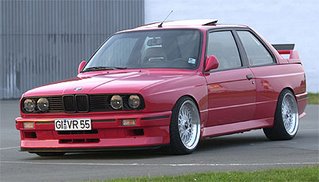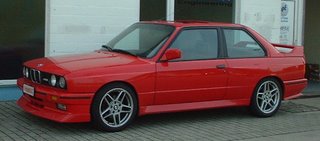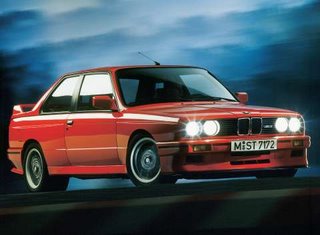




The BMW M3 is a sports version of the popular compact BMW 3-Series automobile, made by BMW Motorsport.
The first M3 was based on the 1986s E30 range, and there has been an M version of every 3-Series since.
M3 E30
Based on the 1986 E30 3-Series body, the first M3 was introduced with a 2.3 L S14 engine, derived from the M10 inline-4 block and the valve train and head architecture from BMWs M1 and later M6 inline-6 cylinder. One of the main reasons for production of the road car was to homologate the M3 for Group A Touring Car racing, as an answer to the "2.3-16V"-model of the Mercedes-Benz W201 which was introduced in 1983. A notable characteristic of the E30 M3 is its racing pedigree, campaigned by BMW as well as other racing teams including Prodrive and Schnitzer Motorsport.
The first version produced 195 hp (143 kW) (catalyzed model). Evolution models (not sold in North America) continued with 2.3 liters but adopted revised cam timing, increased compression along with the lack of a catalyst producing approximately 215 hp. Later the Sport Evolution model increased engine displacement to 2.5 L and produced 238 hp (175 kW). 786 cabriolets were also produced, all by hand in BMWs Garching plant, at the time the 215 hp example was the world's fastest four seater convertible.
The M3 E30 differed from the rest of the E30 line-up in many ways. The M3 was equipped with "box flared" fenders to accommodate a wider track with wider and taller wheels and tires. It also had three times the caster angle of any other E30. The M3 shared larger wheel bearings and front brake calipers with the E28 5-Series.
To keep the car competitive in racing following homologation rules, homologation specials were produced. Homologation rules roughly stated that the Race version must reflect the street car aerodynamically and in engine displacement therefore improved models were periodically released for the public. Special editions and homologation specials include: the Evo I, Evo II and Sport Evo (AKA. Evo III) some of which featured less weight, improved aerodynamics, taller front fender arches (Sport evo; to further facilitate 18 inch wheels in DTM), Brake ducting, and more power.
Production of the original M3 (E30 coupe) ended in 1991.
Having won more road races than any other model in history, the E30 M3 is considered by many to be the world's most successful road race car. It's wins include the Deutsche Tourenwagen Meisterschaft, European Touring Car Championship and even the one-off world title in 1987. The M3 E30 is also a multiple winner of Guia Race, 24 Hours Nürburgring and Spa 24 Hours.
In 2004, Sports Car International named this car number six on the list of Top Sports Cars of the 1980s.
(2.3l-16v I4) - 143 kW/195 bhp 0-60 mph - 6.9 s. Top Speed: 140 mph (225 km/h)
(2.5l-16v I4) - 175 kW/238 bhp 0-60 mph - 6.2 s. Top Speed: 150 mph (241 km/h)
The first M3 was based on the 1986s E30 range, and there has been an M version of every 3-Series since.
M3 E30
Based on the 1986 E30 3-Series body, the first M3 was introduced with a 2.3 L S14 engine, derived from the M10 inline-4 block and the valve train and head architecture from BMWs M1 and later M6 inline-6 cylinder. One of the main reasons for production of the road car was to homologate the M3 for Group A Touring Car racing, as an answer to the "2.3-16V"-model of the Mercedes-Benz W201 which was introduced in 1983. A notable characteristic of the E30 M3 is its racing pedigree, campaigned by BMW as well as other racing teams including Prodrive and Schnitzer Motorsport.
The first version produced 195 hp (143 kW) (catalyzed model). Evolution models (not sold in North America) continued with 2.3 liters but adopted revised cam timing, increased compression along with the lack of a catalyst producing approximately 215 hp. Later the Sport Evolution model increased engine displacement to 2.5 L and produced 238 hp (175 kW). 786 cabriolets were also produced, all by hand in BMWs Garching plant, at the time the 215 hp example was the world's fastest four seater convertible.
The M3 E30 differed from the rest of the E30 line-up in many ways. The M3 was equipped with "box flared" fenders to accommodate a wider track with wider and taller wheels and tires. It also had three times the caster angle of any other E30. The M3 shared larger wheel bearings and front brake calipers with the E28 5-Series.
To keep the car competitive in racing following homologation rules, homologation specials were produced. Homologation rules roughly stated that the Race version must reflect the street car aerodynamically and in engine displacement therefore improved models were periodically released for the public. Special editions and homologation specials include: the Evo I, Evo II and Sport Evo (AKA. Evo III) some of which featured less weight, improved aerodynamics, taller front fender arches (Sport evo; to further facilitate 18 inch wheels in DTM), Brake ducting, and more power.
Production of the original M3 (E30 coupe) ended in 1991.
Having won more road races than any other model in history, the E30 M3 is considered by many to be the world's most successful road race car. It's wins include the Deutsche Tourenwagen Meisterschaft, European Touring Car Championship and even the one-off world title in 1987. The M3 E30 is also a multiple winner of Guia Race, 24 Hours Nürburgring and Spa 24 Hours.
In 2004, Sports Car International named this car number six on the list of Top Sports Cars of the 1980s.
(2.3l-16v I4) - 143 kW/195 bhp 0-60 mph - 6.9 s. Top Speed: 140 mph (225 km/h)
(2.5l-16v I4) - 175 kW/238 bhp 0-60 mph - 6.2 s. Top Speed: 150 mph (241 km/h)





No comments:
Post a Comment